#hasen
Text
choose your favourite ship ❤️🚢
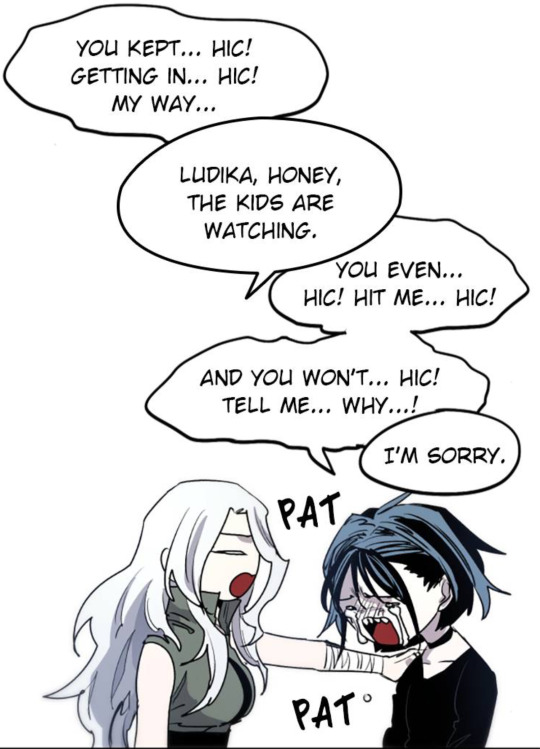



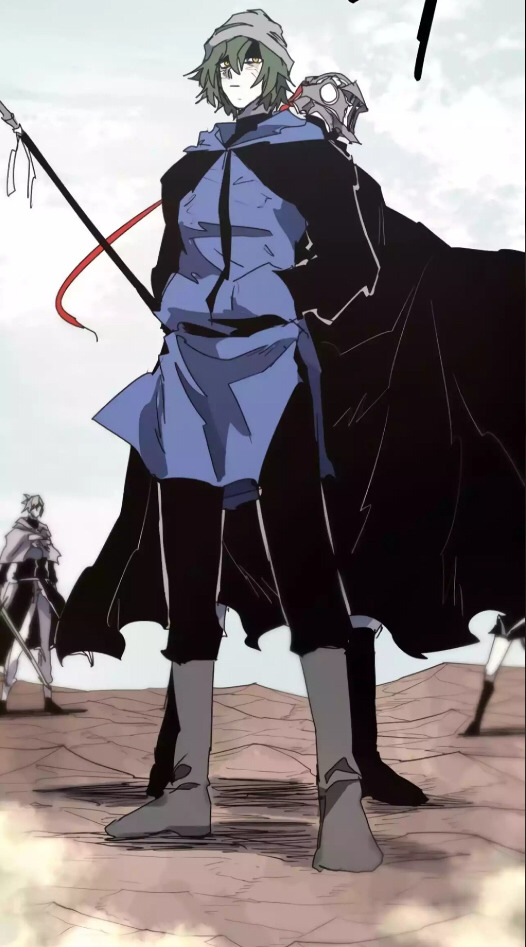
(I’ve been seeing some tournament polls lately and it seems like fun so I’m giving it a try)
#the ember knight#tournament poll#character ships#Nagunn#Lauzun#Waron#Zius#Ludika#Fadiyan#Solvas#Hasen#Marsha#webtoon#webcomic#manhwa
26 notes
·
View notes
Text

I had a mighty need for some simple HasEn stuff and drew the lil gays
74 notes
·
View notes
Text
I Lie to Myself Parody Part 2
A sequel to the silly fancomics I did back then (I Lie to Myself Part 1 https://www.tumblr.com/pybownies/697530852667752448/i-lie-to-myself-parody)
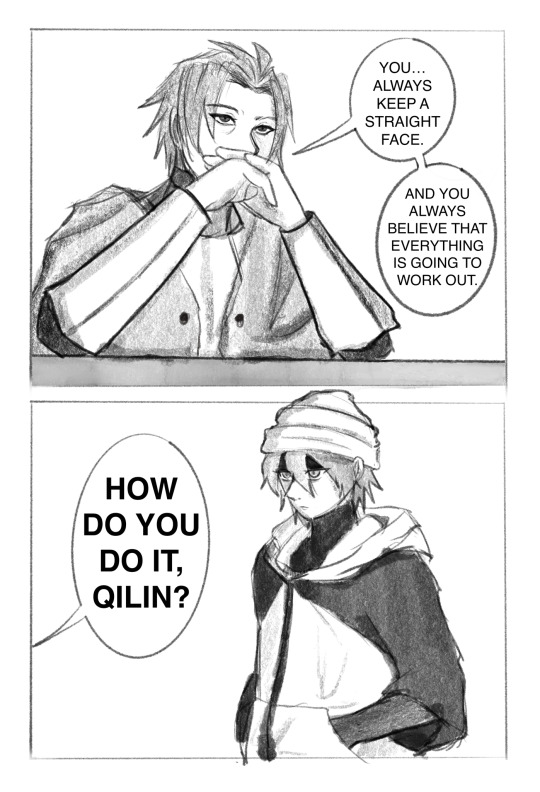
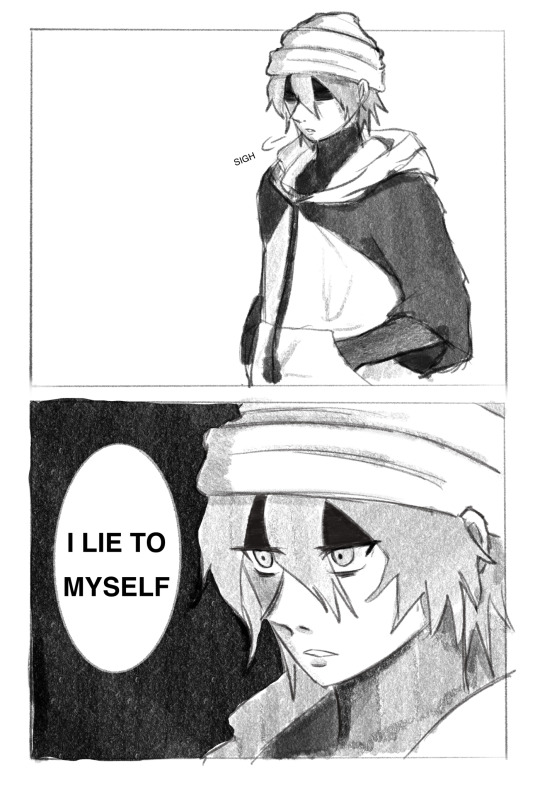
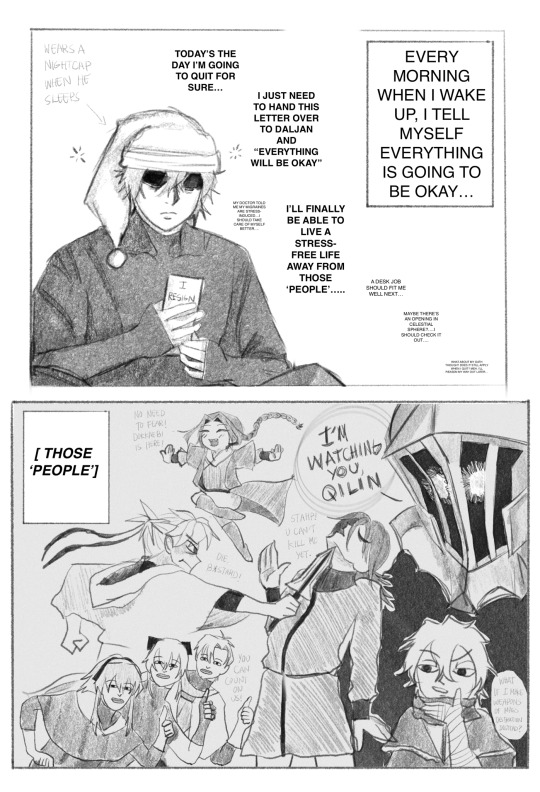
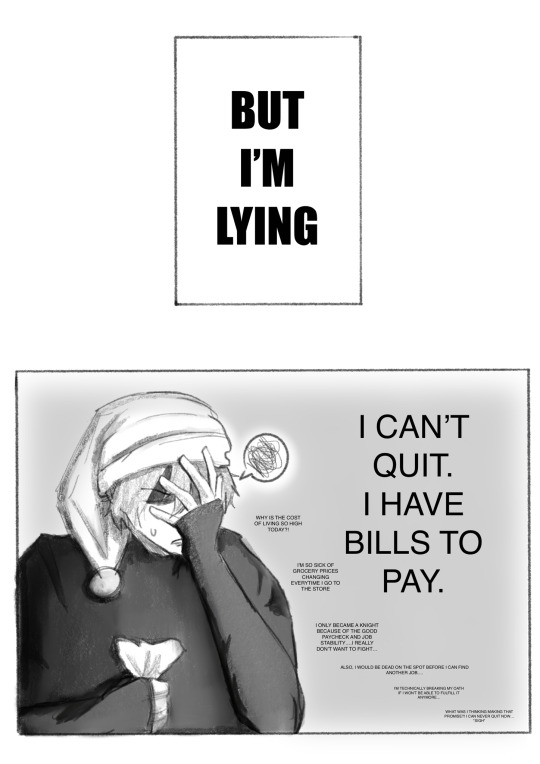
#the ember knight#zius#qilin#nagyuun#waron#laurun#legia#dokkaebi#tanshirin#hasen#solvas#i tried to make him extra dead inside#the sequel that no one asked for lol#i can’t draw all the problematic characters so i chose the top 8 instead#adult life problems#qilin was a bit out of character here…#i think?#so i was a bit hesitant to post this#but yolo so i finally post it after a long time lol#hope you enjoy#my art
17 notes
·
View notes
Text
Zius: there are three chairs and five kids. what do you do?
Waron: get two more chairs.
Darang: cut each chair in half to make six!!
Solvas: make them FIGHT for their seats!
Hasen: I would never be near children.
Ludika: get rid of two kids.
#source: unknown#incorrect ember knight#ember knight#the ember knight#incorrect quotes#nagyunn#zius#waron#solvas#hasen#ludika#darang#lessons with zius
7 notes
·
View notes
Text
Qiang Jin Jiu Retold as Memes: Part II
Part one in case you missed the madness.
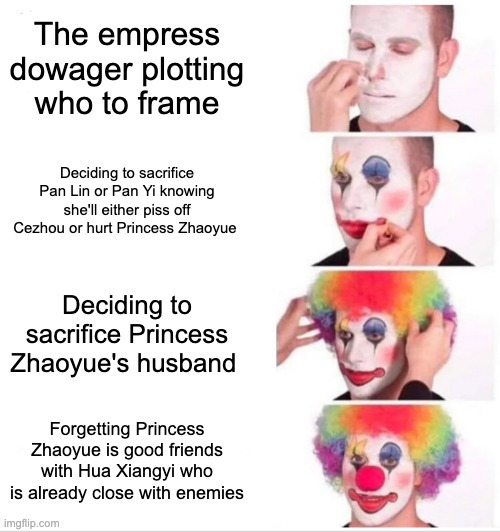
Fei Sheng to Huo Lingyun:
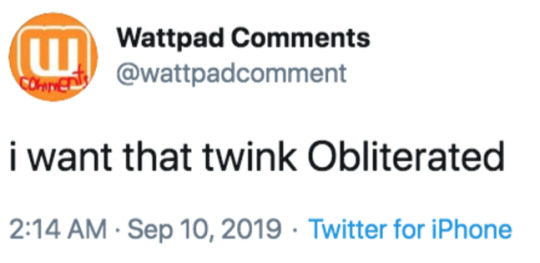
Yan Heru:

The Empress Dowager getting angry at anyone who suggests trying to get Hua Xiangyi to help scheme while Hua Xiangyi’s like:
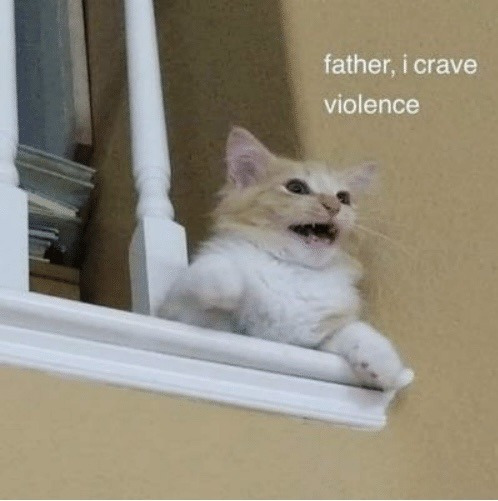
Yan Heru to Shen Zechuan regarding the Venerable Master:
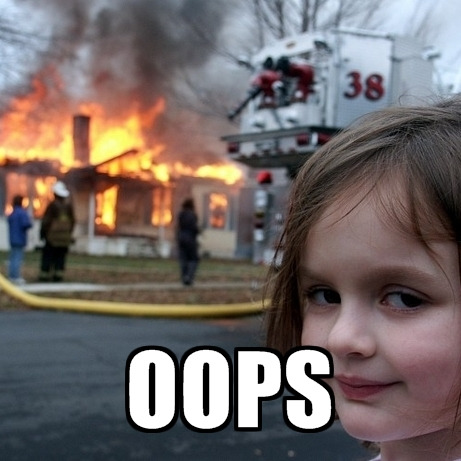
Shen Zechuan’s response:
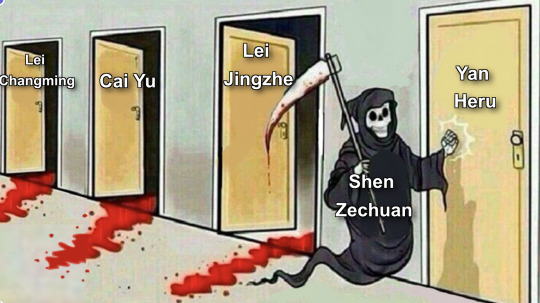
Fengquan to Ling Ting (also me to Ling Ting):

Ling Ting when they murdering Han Cheng and he insults her:
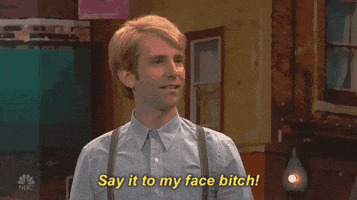
Hua Xiangyi and Qi Zhuyin when they visit Qudu:
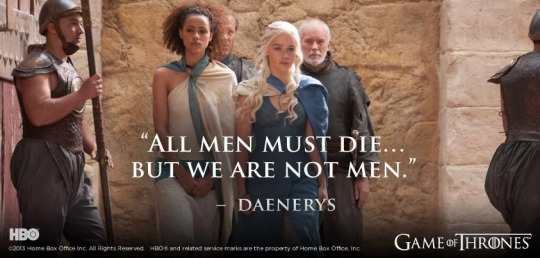
Ji Gang when he walks in on Xiao Chiye leaving Lanzhou’s bedchamber:
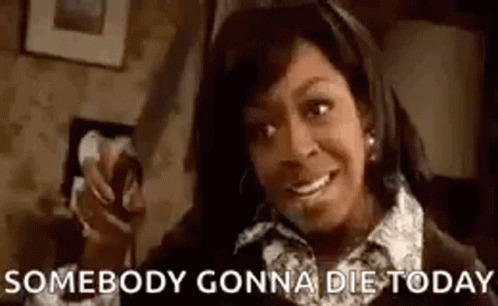
Meanwhile Fei Sheng:
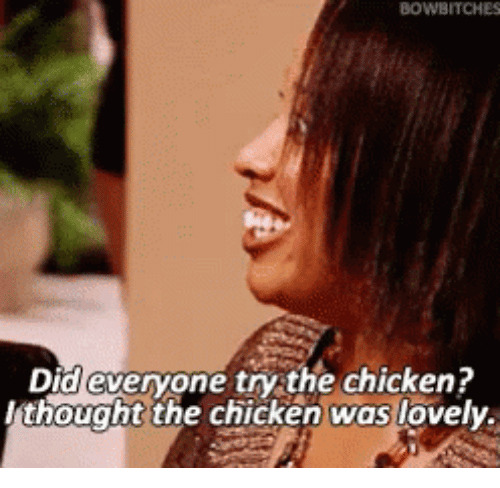
Shen Zechuan to Ji Gang:
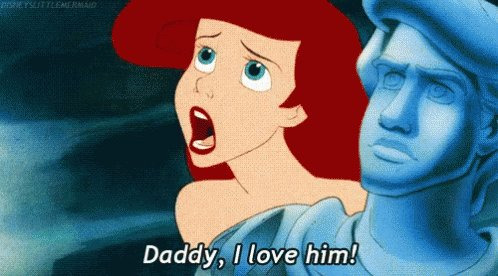
Shen Zechuan: ... and ... I really want to marry him ...
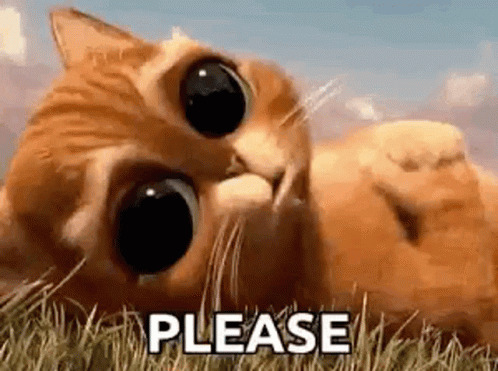
Hasen rolling up to Duanzhou like:

Shen Zechuan to Hasen:
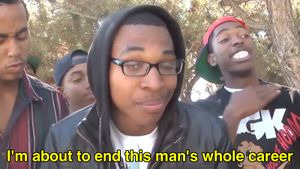
Yin Chang knowing he’s about to die and determined to go out with style:

Readers to Xiao Chiye about Hasen:

Hasen realizing the wolf is here:
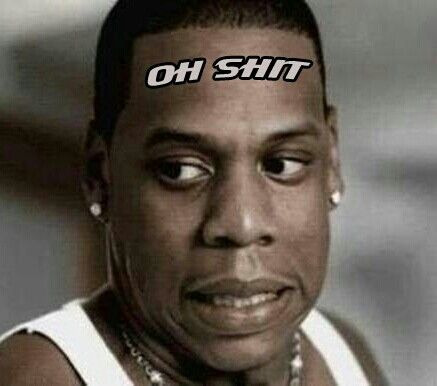
Xiao Chiye to Hasen: “I. Was. Looking. For. You.”
Hasen:
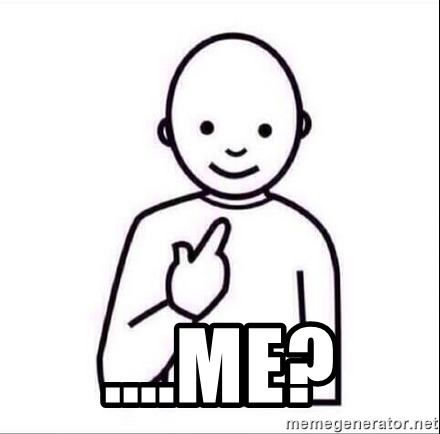
Shen Zechuan watching Xiao Chiye kill Hasen:

Jiran the monk apprentice ready to join Ding Tao and Li Xiong in one brain cell land:
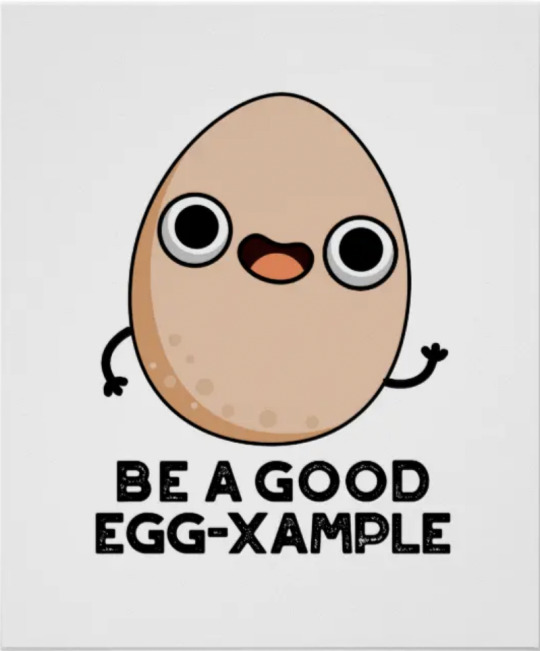
Hua Xiangyi when the Empress Dowager dies:
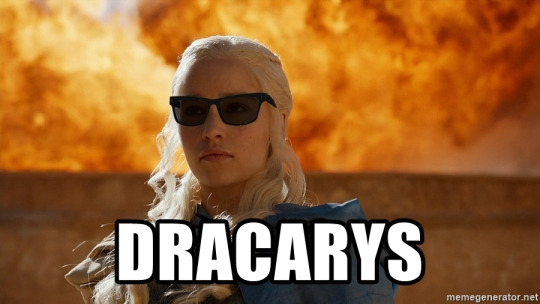
Duo’Erlan:
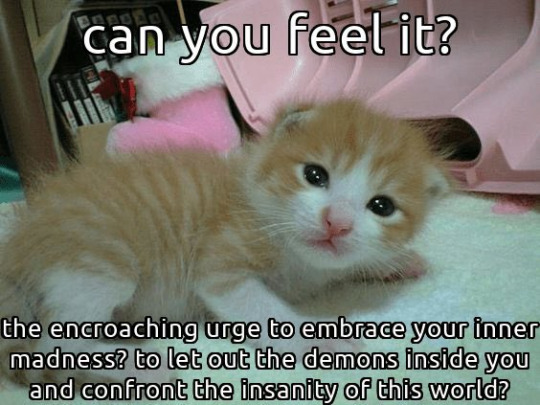
Xue Xiuzhou:

Fengquan:
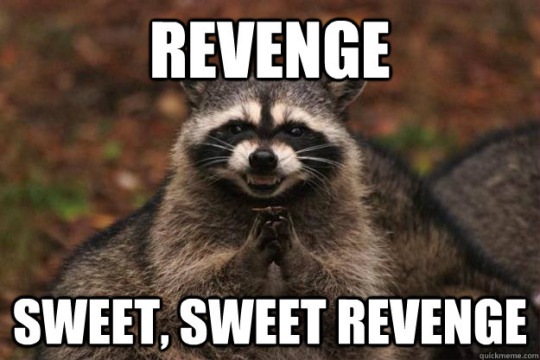
Li Jianting:
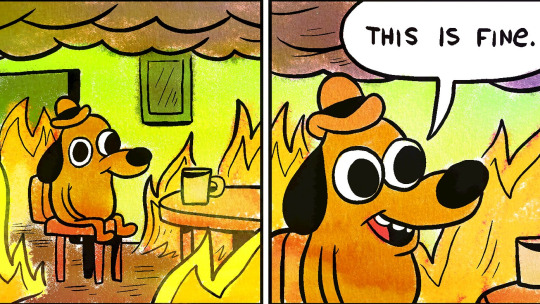
Yao Wenyu after Lanzhou wins:
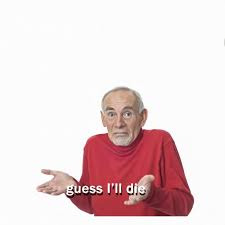
Qiao Tianya to Jiran:

Cezhou in the throne room:
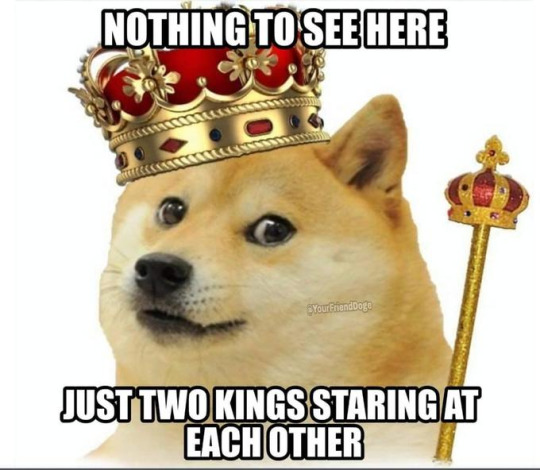
#shitposts#qiang jin jiu#qjj#danmei#crack#shen zechuan#cezhou#xiao chiye#hasen#duo'erlan#li jianting#fengquan#qiao tianya#yao wenyu#huo lingyun#fei sheng#ji gang#qi zhuyin#hua xiangyi#xue xiuzhou
199 notes
·
View notes
Text

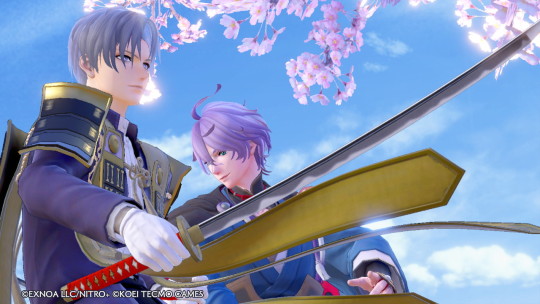

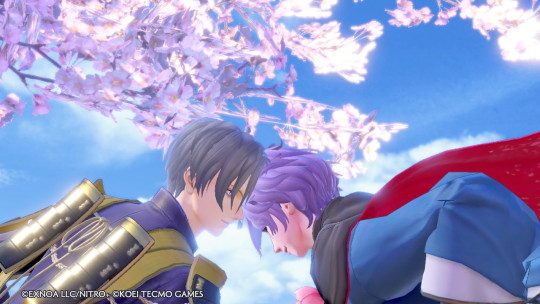
[撮影]Switch TVモード
[序章]本丸襲撃・第一部隊、出陣
[伯仲の章]小牧長久手の戦い・官兵衛の介入
#刀剣乱舞無双#へし切長谷部#歌仙兼定#はせん#とうむそ写真部#touken ranbu warriors#touken ranbu musou#heshikiri hasebe#kasen kanesada#hasen#tkrbw photo club
13 notes
·
View notes
Text

Moinsen, werte Hamsters :) Have a schnieke Tag!
2 notes
·
View notes
Text
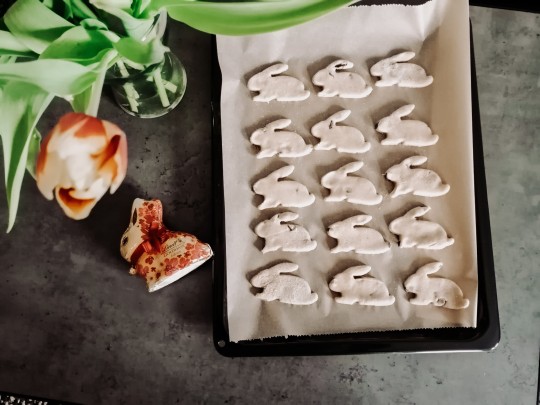
4 notes
·
View notes
Text
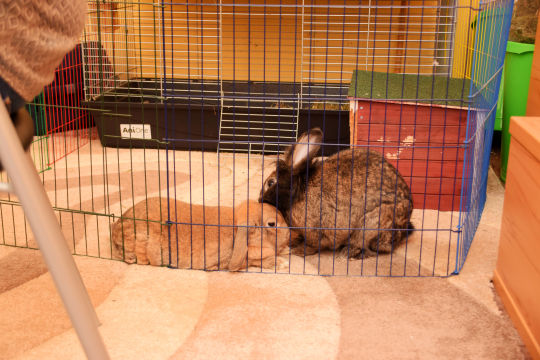
Alte Freunde
best Friends
Zwei gute alte Freunde haben diese Welt verlassen. Hier eine Erinnerung an viele gute Jahre miteinander.
#hasen#best friends#east germany#lower lusatia#niederlausitz#alte freunde#old friends#tiere#altes paar#erinnerung#gute jahre
2 notes
·
View notes
Photo

H A P P Y E A S T E R ! #happyeaster #easterbunny #froheostern #osterhase #hasen #kaninchen #bunny #bunnylove #bunnylover #cute #cuteanimals #cutnessoverload #poster #posterart #wallart #illustration #illustrationart #instaart #framedart #framed #digitalart #handmade #vectorart #dieterbraun #brauntown https://www.instagram.com/p/Cq2w1VENAPy/?igshid=NGJjMDIxMWI=
#happyeaster#easterbunny#froheostern#osterhase#hasen#kaninchen#bunny#bunnylove#bunnylover#cute#cuteanimals#cutnessoverload#poster#posterart#wallart#illustration#illustrationart#instaart#framedart#framed#digitalart#handmade#vectorart#dieterbraun#brauntown
6 notes
·
View notes
Photo
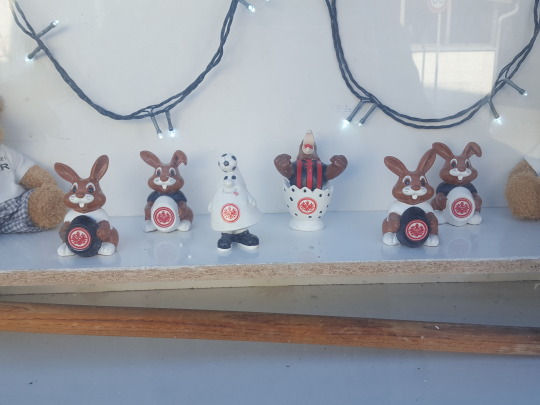
Eschersheim.
3 notes
·
View notes
Text
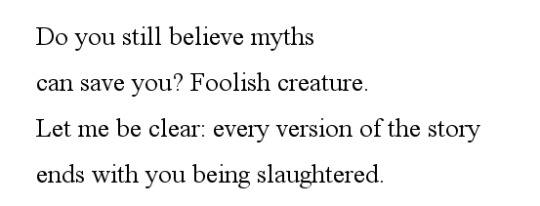
thinking abt this quote and lyn thinking genuinely like. hes gonna die soon. but hes gonna go out in a blaze of glory he knows it. and he goes on and reaches for more and puts himself in more and more danger for that feeling of having finally made it. he wants to get to the end of his story. he wants to become immortalized in that brilliant glory all heroes have. but in the end its hasen who falls before his time and its lyn who finds a reason to live.
0 notes
Text

Oh well...
0 notes
Text
Tanshirin: I have a problem. Solvas isn't talking to me.
Hasen: enjoy it while it lasts.
#source: golden girls#incorrect ember knight#ember knight#the ember knight#incorrect quotes#tanshirin#solvas#hasen#bunny badger
8 notes
·
View notes
Text
Enemies to Lovers: Cezhou's Defeats & Victories
Enemies to lovers. Such a popular trope, and such a well-used one in Qiang Jin Jiu. But, as I said here, the ultimate enemy Shen Zechuan and Xiao Chiye each face is not each other, nor is it the corrupt dynasty or the Biansha Tribe.
It’s themselves.
Shen Zechuan said leisurely, “I can just admire myself in the mirror; there’s no need for another person.”
“You still don’t know how to have fun.” Xiao Chiye said. “How can self-admiration be as delightful as being admired by me? Both of us have to be reflected in the mirror for it to be aesthetically rousing.”
With glistening eyes rippling with desires, Shen Zechuan asked, “So what’s considered aesthetically rousing?”
“Seeing is believing.” Xiao Chiye checked Shen Zechuan’s temperature. “Try it with me one of these days, and you’ll find out.”
Shen Zechuan is wrong in this passage. He needs to see others around him--especially, of course, Xiao Chiye. Xiao Chiye, too, needs to have Shen Zechuan there to not just be fully alive, but to be fully himself. This begins even before the novel proper begins: Shen Zechuan was saved from the Chashi Sinkhole by his elder martial brother, Ji Mu, and was then immediately captured by Xiao Jiming, the elder brother of his future other-half. What Shen Zechuan lacks, he finds in Xiao Chiye, and vice versa.
What does it mean to lose yourself, and what does it mean to find yourself? Well, let’s look at Cezhou’s losses and victories, shall we? Specifically, their first major military losses operating on their own: to Huo Lingyun and to Hasen, and then their final military victories on their own: over Qudu and over Hasen.
Defeat: Huo Lingyun and Hasen 1.0
Both Shen Zechuan and Xiao Chiye experience a defeat at their first conflict with Huo Lingyun and Hasen. The difference, of course, is that Xiao Chiye’s defeat is in-person, while Shen Zechuan’s defeat is via his representatives in Fei Sheng and his troops. This fits with Shen Zechuan’s role, as observed by Xiao Fangxu: “Men like this can’t fight battles, yet they can come out on top to stand upon a mountain of corpses amidst a sea of blood.”
Through seeing how Shen Zechuan and Xiao Chiye interact with these respective foils in Huo Lingyun, Hasen, and Li Jianting (all five of whom claim legacies via seeking revenge for family; in 4/5 cases it’s their fathers specifically), we can see not only the central flaws Shen Zechuan and Xiao Chiye each respectively overcome, but what the novel is trying to say about what it means to get to know yourself, what it means to create a lover from an enemy, and what victory over an enemy actually is.
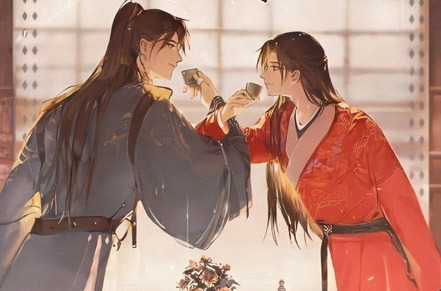
Shen Zechuan and Huo Lingyun
How Shen Zechuan finds himself seems pretty clear. Throughout the novel Shen Zechuan slowly gathers allies, who all represent parts of himself:
Ji Gang: desire to live and grief
Xiao Chiye: strength and family
Qiao Tianya: bitterness and loss
Yao Wenyu: physical weakness
Gao Zhongxiong: shame
Fei Sheng: the search for a purpose
Hairigu: his mother’s legacy
Huo Lingyun: trauma
Qi Zhuyin: non-conforming and underestimated
Hua Xiangyi: kindness
This list is by no means exhausted and is simplified, but you get the idea. Not to mention, most of these people have, at some point perhaps with the one exception of Ji Gang, been an enemy or at the very least a rival of Shen Zechuan’s.
Shen Zechuan starts the novel with nothing, with every part of his life seemingly over except for the physical, which is locked up. Of course that’s symbolic too: Shen Zechuan’s primary internal conflict is in locking himself up and hiding his true nature.
Shen Zechuan’s true nature is not fierce either: it’s wounded and empty; submissive, no, but hollow all the same. Yes, he bites back, but because he was first bitten. He has little purpose or drive: yeah, he’s leading a rebellion, but why exactly? He’s not great at answering that question, because to answer that question would mean admitting certain things about himself that he would rather not.
Yet, Xiao Chiye is aware of Shen Zechuan’s true nature from the start. It’s important that Shen Zechuan becomes completely unable to hide it during a physical act (sex) because the physical is Shen Zechuan’s sacrificial mask in other circumstances, but not with Xiao Chiye. Instead, the physical heals with Xiao Chiye.
He could not keep up an ounce of pretense, and what remained of “Shen Zechuan” lay fully exposed before Xiao Chiye. This was a side of him that Shen Zechuan himself could not bring himself to face. All that had to do with hypocrisy, deceit, and hostility was swept up into the tidal waves of desire.
So what is this part of himself Shen Zechuan cannot face? Shen Zechuan has been hurt his entire life. In contrast to Xiao Chiye, he does not need to defeat himself. He needs to embrace and accept every part of himself in order to find his purpose. These hypocrisies, deceits, hostilities, betrayal and loyalty and hatred, are all most blatantly embodied in Huo Lingyun.
Huo Lingyun, like Shen Zechuan, operates from the shadows and masks his true self. He sets up an elaborate plan to get revenge for his father’s death at King Li’s hand, but uses his own body as bait for it (much like Shen Zechuan continually does, to Xiao Chiye’s chagrin: while Huo Lingyun’s bait is sexual and Shen Zechuan’s is violent, they are both still sacrificing their bodies for a cause).
Huo Lingyun is sexually abused by King Li and then by Cuiqing, and then has the woman torn apart by dogs. The woman is the one who raised and sold Shen Zechuan’s mother--even if not as a prostitute, there is certainly a sense of poetry to this woman being finally destroyed by a clear parallel of Shen Zechuan. Huo Lingyun succeeds by acting as if his father meant nothing to him, when in actuality, his father meant everything to him.Shen Zechuan also starts off motivated in part by a father, to prove that “Shen Wei never collaborated with the enemy.” And indeed Shen Wei didn’t, but it was precisely Shen Wei’s intense fear of being seen as collaborating with the enemy that led to him strangling Bai Cha, a woman who was not only Shen Zechuan’s mother but one of the few people who cared for others no matter their heritage.
So, who then is Shen Zechuan really fighting for? Just for himself? He states that this is the case:
“Regardless of who my parents are... I am Shen Zechuan... I am my own nightmare.” ... Shen Wei, Bai Cha. He did not care for them at all.
Surely this is somewhat true, but is this entirely accurate? Shen Zechuan is a highly unreliable narrator, holding the reader at a distance as he holds most people (save Xiao Chiye). It might have been accurate when he spoke it, but it is almost certainly not actually accurate considering he didn’t even know his mother’s story at the time. When he accepts his mother’s true story from Hairigu, he gains new allies in those his mother helped save.
Similarly, when Shen Zechuan accepts Huo Lingyun, he gains another new ally (and invigorate the flagging loyalty of Qiao Tianya). Huo Lingyun is first introduced to Shen Zechuan as a prisoner in shackles too heavy for him, and Xiao Chiye initially dislikes him. (Fei Sheng’s attitude towards Huo Lingyun is a mirror of Xiao Chiye’s attitude towards Shen Zechuan too.) It’s all very much a callback to the first chapters of the novel, and a challenge to Shen Zechuan to acknowledge the parts of himself he would rather not: his weakness, his suffering, and the consequences of his actions.
Everyone mistrusts Huo Lingyun, for good reason, just as they mistrusted Shen Zechuan. Huo Lingyun doesn’t do himself a lot of favors when he insults Xiao Chiye. But, it is then significant that Xiao Chiye stands up to him and helps Huo Lingyun find a place, because this moment reflects how Xiao Chiye and Shen Zechuan are polishing each other by working together like iron sharpening iron. Shen Zechuan gives Huo Lingyun a chance symbolizes him giving the worst parts of himself a chance to improve, trusting Xiao Chiye to hold them in check.
Xiao Chiye and Hasen
If Shen Zechuan’s motif is finding and specifically gathering, Xiao Chiye’s is in losing. But, he’s a victorious general, obviously, though this by no means comes easily to him. By the time he’s faced his first loss in battle, he’s already lost in other ways:
His home
Tantai Hu (whom he gains back, but the point is that Xiao Chiye has to first lose things to get them back)
His friend, Li Jianheng
Xiao Jiming has been defeated
His own reputation is shot
But how do you tame a wild animal? As is noted by Xiao Chiye himself with Meng, the falcon, through hardships. Torture even, breaking its will, etc. Hence, it makes sense that for Xiao Chiye to tame himself, he has to lose again and again and again.
That said, Xiao Chiye faces no military defeat until he does at Hasen’s hand. And in contrast to Shen Zechuan’s standoffishness creating his own defeat with Huo Lingyun via Fei Sheng, it’s Xiao Chiye’s activeness that creates his defeat:
Xiao Chiye thought he was taking the initiative, but he was, in fact, paralyzing himself. Right from the moment he decided to turn around and head for the Tudalong Banner, he had already fallen into the role of the passive player.
Hasen himself takes note of this:
“His desire to win is too strong... Like my father, he won’t allow himself to cower and retreat. This is his strength, but also his weakness...”
So what saves Xiao Chiye’s life this battle? Well, firstly, Shen Zechuan (even though, as is usual for Shen Zechuan’s battle motif, he’s not physically present):
A loud “THUD” rang out as the blow was blocked by the arm guard Shen Zechuan had gifted him.
And of course, his father riding in to save the day. Xiao Fangxu’s following advice to Xiao Chiye about his defeat is interesting:
“You don’t need seven years to defeat Hasen.” Xiao Fangxu gazed at Xiao Chiye and said, “But you must learn to be tolerant.”
The interesting part of this is that this statement occurs within Xiao Fangxu expressing his insatiable desire to win in warfare. What does tolerance have to do with that?
Because the real battle isn’t physical. It’s inside. I’m not saying it’s a trite “believe in yourself” (on the contrary) but instead it’s about taming yourself for the sake of a broader picture. Taming wild beasts is a motif of Xiao Chiye: he tames Meng the falcon, his wild horse, even Shen Zechuan to an extent, but the one he ultimately needs to tame is himself. He can’t act selfishly. He has to act with the good of others in mind, including his family. He has to act with love, which is not the same as acting with desire (hence why it’s symbolic Xiao Chiye and Shen Zechuan’s relationship starts with being purely physical and slowly becomes something far more intimate).
Xiao Chiye, much like Shen Zechuan, cannot be motivated by simply wanting to defeat enemies, because often enemies are part of you. He must be motivated by those who love him and whom he loves.

When Xiao Chiye is first brought back to Qudu, he lashes out multiple times at Shen Zechuan because he sees himself in him: an innocent child in prison for the military actions of a father and brother. The only difference is that for Shen Zechuan, it was the Shens’ defeat; for Xiao Chiye, it was Xiao Jiming’s victory. Win or lose; it’s all the same. The children still wind up as prisoners, not just of corrupt kingdoms, but of hatred and warfare and corruption. We see it with Huo Lingyun, with Hasen, with Li Jianheng, Li Jianting, and more.
Xiao Chiye and Hasen 2.0
Xiao Chiye then finds himself engaging in a series of victories over Biansha. Well, victories-ish. Because the motif of losing to be tamed is still there.
Firstly, Xiao Chiye loses his father, but then finds some semblance of himself back when he singlehandedly storms the enemy camp to get Xiao Fangxu’s head back. It’s interesting that he interrupts Hasen as Hasen is pondering the reality of what victory might mean:
To both parties, excessive compassion was tantamount to suicide...
What does strict revenge actually offer? The answer is that it offers nothing.
Hasen had been waiting for this moment for a very long time.
“But you don’t look very happy,” Wulihan said.
“Not quite what I expected.” Hasen held up the bowl with both hands and remembered his war trophy. “I grew up listening to legends of him. He’s invincible, coming from my father’s mouth.”
Killing just continues the cycle. Xiao Chiye getting his father back is, on the one hand, an incredibly risky and stupid move. On the other hand, he succeeds thematically because he’s driven by pure love for his father. He will not allow his father’s legacy to be a head mocked by enemies. Victory is not in killing or battling an enemy.
Xiao Chiye’s subsequent confrontation with Hasen warns him of what could happen:
He stared at Hasen and said, one word at a time, “Give my father back to me.”
Hasen brushed back the red hair that was hanging over his eyes and looked at Xiao Chiye as he said in a cold, detached voice, “Then, when will your father give my brother back to me?”
Xiao Chiye had already sprung closer. He had no wish to hear Hasen speak at all...
Hasen twirled out a new piked dagger between his fingers. He slid those fingers along the cold gleam of the blade and said expressionlessly, “I’m merely returning the favor tit for tat.”
Xiao Chiye has no wish to hear Hasen speak, because compassion has little place in the world of Qiang Jin Jiu’s Dazhou. Or does it? Because Bai Cha’s legacy endures because of her compassion, not in spite of it. Xiao Chiye gets his life saved because of Shen Zechuan’s romantic love, not in spite of it. Xiao Fangxu’s head is rescued because of compassion, not in spite of it.
Yet, Xiao Chiye has already learned an important lesson: to defeat an enemy, you have to learn to think like them. Instead of relying on his own strength and prowess, like he did the first time he fought Hasen, he learns to think like his enemy, and that is what gives him a heads-up (i’m sorry) that something is wrong with Xiao Fangxu.
Xiao Chiye... paced back and forth in the same place and rubbed away those haphazardly drawn lines. He gradually stopped tracing Xiao Fangxu’s path and put himself in Hasen’s position.
To overcome himself, he must think like the enemy. To defeat his enemy, he must overcome himself. Xiao Chiye is as much his own enemy as Hasen is, and everyone realizes this. It’s why the Empress Dowager is convinced Xiao Jiming and Xiao Chiye will turn on each other, why Xiao Fangxu scolds him instead of praising him, and why Shen Zechuan nearly ends up dead from a certain kick. But in each of these relationships, love proves to be an elixir healing them, helping Xiao Chiye paradoxically become more himself and also more like those around him. Chief among these is Cezhou.
Xiao Chiye’s relationship with Shen Zechuan can be seen as symbolic of a new way forward, of making family out of enemies.
Of course, the other party has to be willing, and Hasen is not:
“After tonight, my name will overshadow the Libei Armored Cavalry. I’ll make you people pay back double for what you owed me since the battles on the eastern mountain ranges.”
Hasen claims to be repaying Xiao Fangxu “tit for tat” for Xiao Fangxu killing his brother. But an eye for an eye makes the whole world blind. This is the same path Shen Zechuan started the novel on, but thanks to his relationship with Xiao Chiye, has been pulled back from.
We see this thematic line continued through Xiao Chiye fighting two more battles against Biansha.
Firstly, he fights A-Chi at the Chashi Sinkhole by tricking A-Chi into falling into the same trap Xiao Chiye once fell into: being too quick to act. Xiao Chiye even changes the field via literally moving the goalposts to trick A-Chai. He’s learning to see the playing field, the bigger picture beyond his wants and needs. Just like Xiao Chiye’s first loss against Hasen, we see Shen Zechuan’s armguard saving Xiao Chiye’s life.
When Xiao Chiye gets buried in the sinkhole with Lang Tao Xue Jin, it’s symbolic of his primitive, immature, animalistic side being buried. He’s symbolically pulled out of the sinkhole by Shen Zechuan, of course, who is terrified. This accomplishes two things: firstly, instead of losing another beloved person to the sinkhole like he lost Ji Mu, Shen Zechuan is able to pull Xiao Chiye out by his hand. Secondly, it forces Xiao Chiye to experience the human crush Shen Zechuan had barely survived back then, even if only for a few moments, forcing him literally into the experience of someone he once considered an enemy. Shen Zechuan, too, goes from being a physical yet object guard to being a physical presence pulling Xiao Chiye from the battlefield, and saving him from the trauma he himself experienced.
It’s only after that experience, that empathy and Shen Zechuan’s saving him, that Xiao Chiye is able to grow up at last. Xiao Chiye is given the chance to grow via learning how to work with his enemies--whether they are Biansha or even from Libei (Guo Weili, who attacked Gu Jin). It’s telling that this is the opportunity Xiao Jiming offers Xiao Chiye to prove he’s really ready to fully grow up and lead in their father’s stead: can you reconcile with your enemies?
And then Xiao Chiye can defeat Hasen at last. This time, Shen Zechuan is not just present in an object, nor does he arrive to save Xiao Chiye after the battle. This time, he’s a physical presence, because the two of them are fully one now.
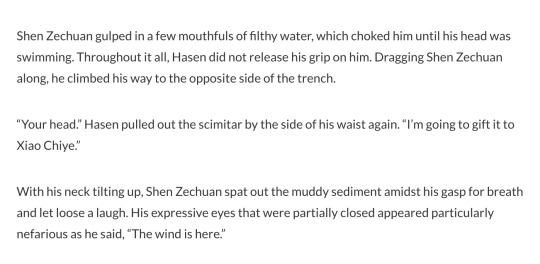
That Xiao Chiye will defeat Hasen at last at Duanzhou is a fitting conclusion: it happens in the same place where Shen Zechuan’s nightmare, where the sins of Shen Wei, linger , thereby resolving Xiao Chiye’s need for revenge for his father, and also for Shen Zechuan’s torture after Shen Wei’s defeat and for Bai Cha’s abuse and murder. For Shen Zechuan’s part, he cannot do it all by himself. He can only reclaim his legacy through others (Xiao Chiye, Fei Sheng, Huo Lingyun, Qiao Tianya, etc).
Xiao Chiye also can only reclaim his trauma through another (Shen Zechuan). Insofar as the trauma concerning Xiao Fangxu’s death is concerned, the final battle at the Chashi Sinkhole is not about Hasen and Xiao Chiye, or Xiao Fangxu. It’s about Xiao Chiye first and foremost saving what he loves in Shen Zechuan. And it’s Shen Zechuan’s presence that gets Hasen and Xiao Chiye to confront one another. That Hasen almost kills Shen Zechuan and indeed wants to use Shen Zechuan’s death to taunt Xiao Chiye is symbolic of Hasen recognizing that befriending your enemies is a new way forward, and not being particularly enthused about it.

Yet the ultimate end goal is not accomplished with Hasen’s death. Amu’Er continues to want to kill in revenge, even though he himself threatened Hasen to bring results or face his wrath.
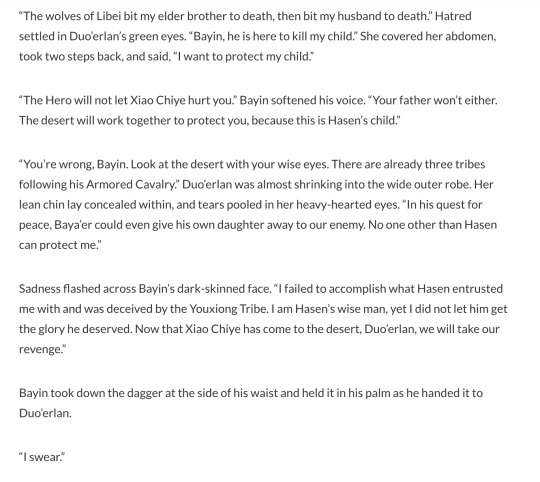
Duo’Erlan waffles between wanting to save her child and wanting revenge. She and Amu’Er both demand that Xiao Chiye give her back Hasen, much like Xiao Chiye demanded that Hasen give him back his father, and so on. The end of Xiao Chiye’s arc is less about killing Amu’Er as it is about sparing Duo’Erlan (a vengeful, angry, hurting person who lost their home and the people they love; aka she’s a Shen Zechuan foil, and a Xiao Chiye one). Xiao Chiye kills the mighty legendary warrior he has always been destined to be, but saves the future he has (raising a child) despite Duo’Erlan’s begging him to kill her if she can’t get revenge.
Shen Zechuan, Li Jianting, & the Role of Emperor
Shen Zechuan’s arc is about his identity, which is not found in the Shens, who rejected him and ignored his existence out of paranoia. It is also not found in a throne or in victory, and it is certainly not found in hatred. Instead, it’s found in acknowledging those who loved him: his allies and their trust in him, his mother and the legacy she left, and the legacy Shen Zechuan builds with Xiao Chiye.
His victory comes when he finds that others need him as emperor, and when he accepts that he can be a good one. One cannot truly become their own person without other people. His victory is in accepting his role with Xiao Chiye’s help.
In a tragic sense, Shen Zechuan also foils Li Jianting here. In the end, she chose to identify herself with her heritage. If her heritage burned, then she would burn with it. She could see no other purpose, and it’s tragic.
Conclusion
Xiao Chiye ends up back in Qudu, but this time he is not a prisoner, but the emperor’s husband. It’s not the circumstances that matter but the people. Additionally, Xiao Jiming sends Xun’Er to Shen Zechuan and Xiao Chiye to raise as heir, a reversal of both Shen Zechuan’s and Xiao Chiye’s circumstances at the beginning. Xiao Xun’s presence is not as a hostage, but instead as an expression of trust in family, of love.
#cezhou#qiang jin jiou#qjj meta#qjj#shen zechuan#xiao chiye#huo lingyun#li jianting#ling ting#hasen#duo'erlan#xiao xun
78 notes
·
View notes
Text
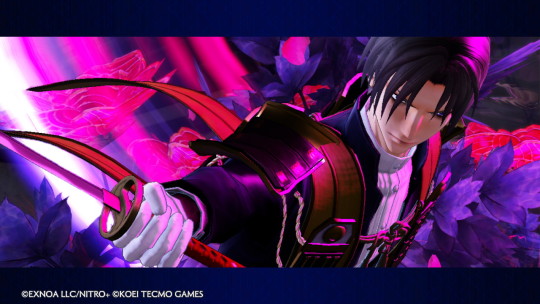
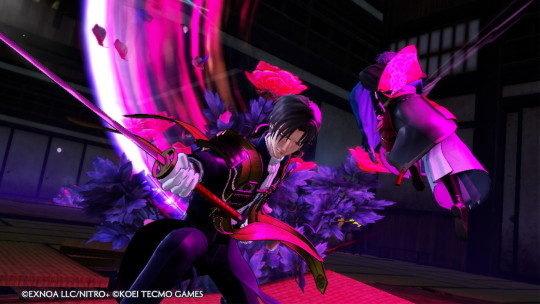


[撮影]Switch Lite
[残影の章]大坂の陣・秀頼の元へ
#刀剣乱舞無双#へし切長谷部#歌仙兼定#はせん#とうむそ写真部#touken ranbu warriors#touken ranbu musou#heshikiri hasebe#kasen kanesada#hasen#tkrbw photo club
5 notes
·
View notes